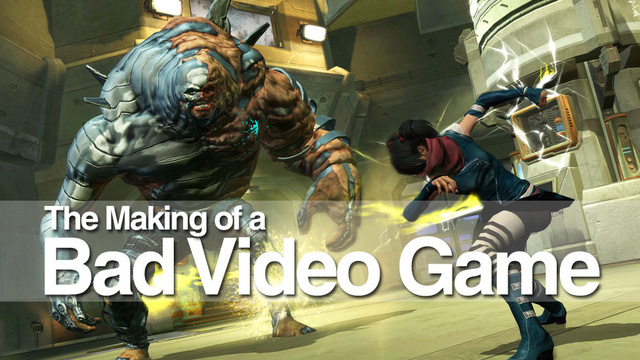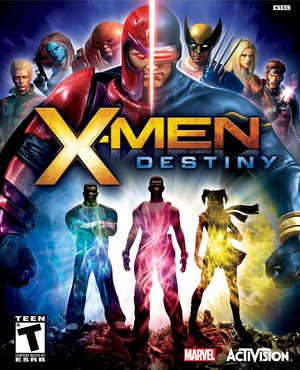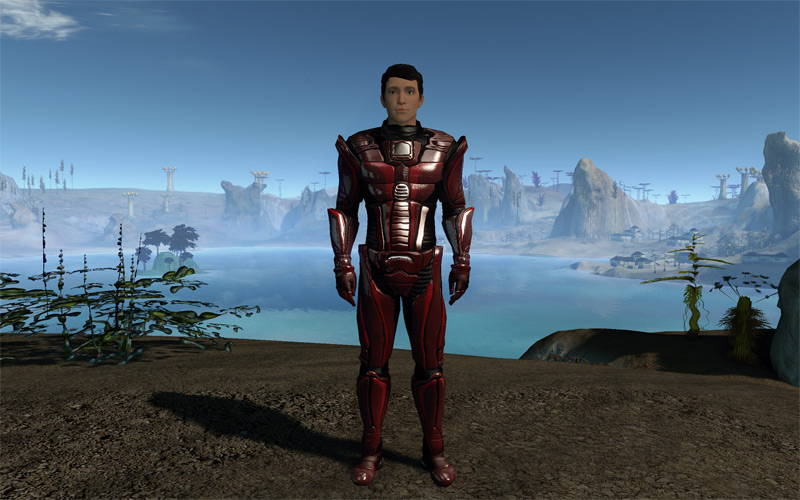What Went Wrong With Silicon Knights’ X-Men: Destiny?
by Andrew McMillen

Bad video games are released all the time. A raft of factors conspire to influence the quality of the outcome. Maybe tight deadlines are to blame. Or maybe the problems include inexperienced developers, incompetent project management, impossible publisher requests, funding concerns. It’s a seemingly unavoidable fact that not every game can be great, or good, or even average.
So how does a game, one made by a celebrated studio and backed by one of the richest game publishers in the world, turn out to be a bad video game? This is a story about exactly that. It’s about Silicon Knights the studio behind the great Eternal Darkness, the miserable X-Men: Destiny. It’s about a proud leader, frustrated ex-employees, many internal clashes and a secret sequel everyone hoped would be great.
To an extent, it’s the role of the gaming media to warn potential buyers away from these inferior gaming experiences, and encourage them to spend time with well-designed games developed by skilled teams, led by sound project management, and unhurried by unrealistic demands. The conventional wisdom is that life’s too short to play every game — or read every book, or listen to every album, or see every film — and as a result, we tend to only want to invest our time and money into the very best.
X-Men: Destiny — developed by Canadian studio Silicon Knights for Xbox 360, PS3 and Wii — could have gone either way. Sure, previous X-Men titles didn’t exactly set the world on fire: 2006?s X-Men: The Official Game, averaged a score of 52 out of 100 on Metacritic across seven platforms, while 2009?s character-focused X-Men Origins: Wolverine averaged a 65 across six platforms.
But X-Men: Destiny (XMD), released September 27, 2011, underperformed them both with a dramatically low Metacritic score of just 41 across four platforms. (The DS version, developed by Canadian studio Other Ocean Interactive, registered a 33 on the site, making it the single worst-reviewed X-Men title in Metacritic’s records.)
There are plenty of possible explanations for the poor result. Maybe the game’s publisher, Activision, rushed the release in an attempt to hit a quarterly revenue goal. Maybe it was just dragged down by the weight of a crappy, overdone superhero licence, as so many games before it. Maybe the title just didn’t come together in the end, or simply failed to resonate with reviewers.
These are all possible, but discussions with former employees of XMD developer Silicon Knights suggest that the game’s fate was sealed long before Activision gave the project a green light back in 2009. The following story excerpts extensive interviews with former Silicon Knights employees who describe their experiences at what they say was a disorganized, unfocused company that squandered ample time and resources before being forced to release a game it was far from proud of.
Management at Silicon Knights refused to be interviewed on the record for this story, despite repeated requests over many months. A spokesperson for the game’s publisher, Activision, also declined requests for comment. Accordingly, keep in mind that what follows is but one side of a very complex story. When first confronted with wide-ranging allegations of XMD‘s tumultuous development in mid-January 2012, company president Denis Dyack gave the following statement:
“Silicon Knights is obligated to its partners (in the case of X-Men: Destiny — Activision and Marvel) to not disclose the development process of any project they work on. These obligations also apply to all the people who worked on X-Men: Destiny. Silicon Knights appreciated the opportunity to work on the game and we hope to get an opportunity to work together with Activision and Marvel again.”
This statement remains the only comment that Kotaku can attribute to the man behind the biggest failure in the studio’s 20-year history.
Enter: “SK Whistleblower”
 It’s not as if Silicon Knights was some untested, fly-by-night developer brought on to quickly crank out just another licensed title. Founded in 1992 by current company president Denis Dyack, the St. Catharines, Ontario-based company is best known for their 2002 GameCube hit Eternal Darkness: Sanity’s Requiem, which scored a “universal acclaim” score of 92 on Metacritic, based on 41 reviews. The company’s 2004 Metal Gear Solid remake, The Twin Snakes, scored 85 across 54 reviews. And while Silicon Knights’ 2008 Xbox 360 release Too Human averaged a sub-par score of 65, the company’s history still suggested it could produce good games.
It’s not as if Silicon Knights was some untested, fly-by-night developer brought on to quickly crank out just another licensed title. Founded in 1992 by current company president Denis Dyack, the St. Catharines, Ontario-based company is best known for their 2002 GameCube hit Eternal Darkness: Sanity’s Requiem, which scored a “universal acclaim” score of 92 on Metacritic, based on 41 reviews. The company’s 2004 Metal Gear Solid remake, The Twin Snakes, scored 85 across 54 reviews. And while Silicon Knights’ 2008 Xbox 360 release Too Human averaged a sub-par score of 65, the company’s history still suggested it could produce good games.
But X-Men: Destiny stands alone as the worst game that Silicon Knights has released since it was founded. How did a company that was once known for compelling, original, quality video games come to release a title best described as “mediocre,” “mindless,” “generic” and “an absolute mess”?
(1UP gave the X360 version a D+, concluding that the game is “is an absolute mess that isn’t worth your time.” IGN gave the PS3 version 5.5 points out of 10 — “mediocre” — and remarked that “even for an action brawler, this one is as mindless as they come.”GameSpot reviewed the same version and awarded the game 4 out of 10, noting that XMD “does the incredible: it makes being a genetic marvel a generic bore.”)
“I am writing to you in regards to Silicon Knights’ upcoming title X-Men: Destiny,” read the July 21, 2011 email from a mysterious, throwaway Hotmail account with the handle SK Whistleblower. “Silicon Knights’ executive team has just recently implemented a new policy to discredit all employees who have recently resigned. This includes employees who have worked on it for between six months and three years. Between 35 to 45 former employees will fail to have their credits appear in the game.”
I knew firsthand how to deal with such serious allegations. At the time, IGN had recently published my 4,500 word feature story based on interviews with 11 anonymous former employees of the Australian studio Team Bondi, in which those developers detailed seven troubled years of work on L.A. Noire; years that culminated with many of those employees failing to receive the credit they believed they deserved for their work. Now, someone was suggesting that Silicon Knights was having similar problems with its latest title.
“Much of what was written about Team Bondi’s situation can be said about Silicon Knights as well,” SK Whistleblower continued. “I am certain that if you contacted former and current Silicon Knights employees and offered them anonymity, you would receive evidence of an appalling antipathy from management towards the employees, publishers, and the quality of their games.”
Anonymous allegations are easy to make; verifying them is much tougher. I spent the next couple of months reaching out to dozens of former Silicon Knights employees, including a list of 32 allegedly omitted names supplied by SK Whistleblower. Many of those who responded confirmed that they, too, had heard the rumours of their names being removed from the credits of XMD. Some refused to speculate (“I can’t confirm who made it into the credits or not until the game is released, so I’m unable to comment”); some expressed concern for their former colleagues (“I feel that any information I give you will only hurt the current employees at SK”); others feared the ramifications of their involvement in this investigation (“any other information possibly leaking would not look good towards my professionalism and possible future opportunities”).
Ultimately, I secured interviews with eight former SK employees who worked on XMD, including the initial whistleblower. Between them, these former staffers represented over 45 years of service to the Canadian game development studio. All of them spoke to me on the condition of anonymity, for obvious reasons. Interviewees suggest that the company has been plagued by a complex set of internal problems for years. It soon became clear that this story was about much more than a minor grievance with SK’s crediting standards.


 It’s not as if Silicon Knights was some untested, fly-by-night developer brought on to quickly crank out just another licensed title. Founded in 1992 by current company president Denis Dyack, the St. Catharines, Ontario-based company is best known for their 2002 GameCube hit Eternal Darkness: Sanity’s Requiem, which scored a “universal acclaim” score of 92 on Metacritic, based on 41 reviews. The company’s 2004 Metal Gear Solid remake, The Twin Snakes, scored 85 across 54 reviews. And while Silicon Knights’ 2008 Xbox 360 release Too Human averaged a sub-par score of 65, the company’s history still suggested it could produce good games.
It’s not as if Silicon Knights was some untested, fly-by-night developer brought on to quickly crank out just another licensed title. Founded in 1992 by current company president Denis Dyack, the St. Catharines, Ontario-based company is best known for their 2002 GameCube hit Eternal Darkness: Sanity’s Requiem, which scored a “universal acclaim” score of 92 on Metacritic, based on 41 reviews. The company’s 2004 Metal Gear Solid remake, The Twin Snakes, scored 85 across 54 reviews. And while Silicon Knights’ 2008 Xbox 360 release Too Human averaged a sub-par score of 65, the company’s history still suggested it could produce good games.